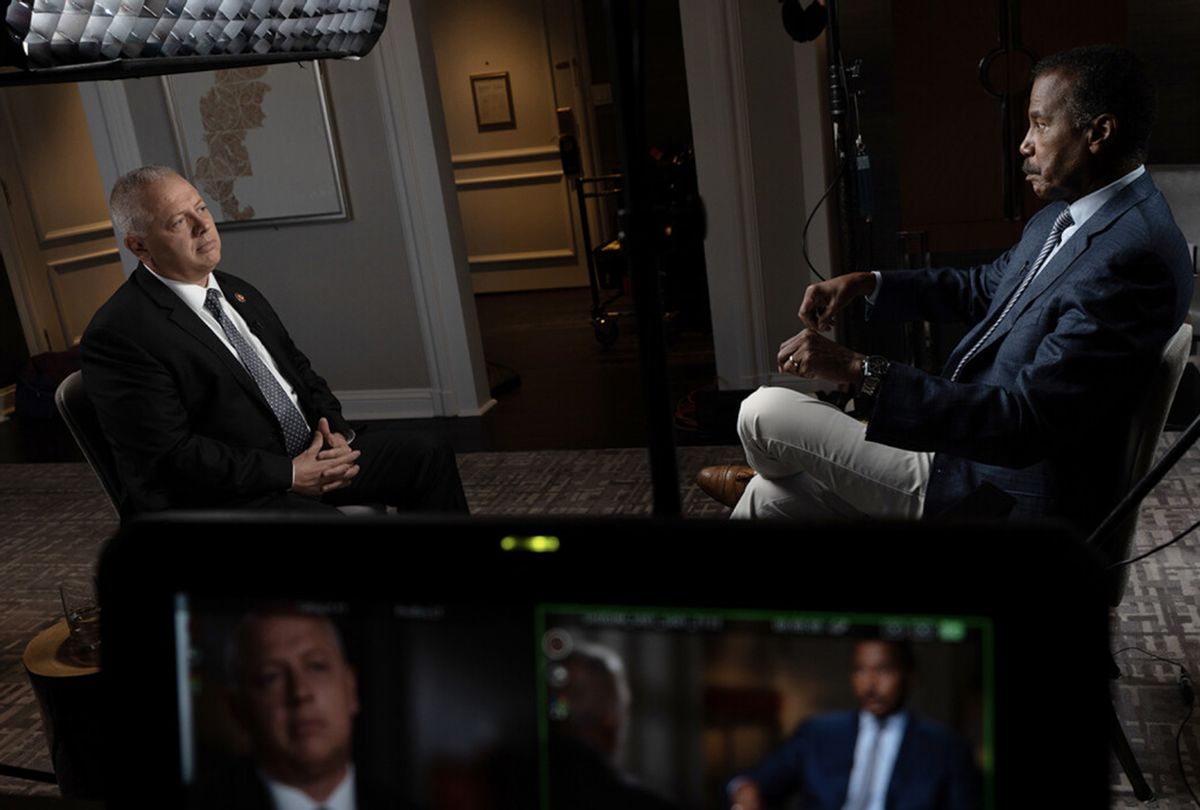Former Rep. Denver Riggleman, R-Va., who served as a senior technical adviser to the House Jan. 6 committee, sounded the alarm over a phone call between a Capitol rioter and the White House on the day of the attack.
Riggleman, who served as an adviser to the committee until April, in an interview with CBS' 60 Minutes provided a behind-the-scenes look at the investigation and warned that the White House link to the insurrection needed to be "explored more."
Riggleman said he had a "real a-ha moment" when he saw "that the White House switchboard had connected to a rioter's phone" while the Capitol attack took place.
Coming from a background in national security and intelligence matters, Riggleman assembled a group of data miners and analysts to sift through 20 million lines of data including emails, texts, phone records, and social media posts tied to the attack on the Capitol.
His team looked closely at six groups, which included the Trump team, Trump family, rally goers, unaffiliated DOJ-charged defendants, Proud Boys and Oath Keepers. He called the data visualization his team created "The Monster," which reveals connections between Jan. 6 attackers and the White House.
Riggleman called for a closer investigation into links between the White House and those involved in the attack.
"The thread that needs to be pulled identifying all the White House numbers and why we have certain specific people, why they were talking to the White House," he told 60 Minutes.
But the committee pushed back on Riggleman's claims. The panel said in a statement to 60 Minutes that Riggleman "had limited knowledge of the committee's investigation" and departed before the committee's "most important investigative work."
Rep. Zoe Lofgren, D-Calif., a member of the committee, told CNN that Riggleman's claim about the mysterious call did not "pan out."
"He does not know what happened after April and a lot has happened in our investigation," she said. "Everything that he was able to relay prior to his departure has been followed up on and in some cases didn't really peter out (sic), or there might have been a decision that suggested there was a connection between one number and one e-mail and a person that turned out not to pan out. So we follow up on everything, and, you know, I don't know what Mr. Riggleman is doing really."
Want a daily wrap-up of all the news and commentary Salon has to offer? Subscribe to our morning newsletter, Crash Course.
CNN reported that the phone that connected to the White House belonged to Anton Lunyk, a Trump supporter from Brooklyn, New York, who traveled to Washington DC the night before the attack on the Capitol, according to the report.
The call came from the publicly available number for the White House and lasted only nine seconds. It's unclear whether the call was made by mistake or whether it was sent to voicemail, but the call came after former President Donald Trump posted a video message on Twitter telling the rioters at the Capitol, "go home, we love you, you're very special," at 4:17pm.
Multiple sources with knowledge of the probe told CNN that "Lunyk says he doesn't remember receiving the nine-second call and claims he doesn't know anyone who worked in the Trump White House."
Rep. Adam Schiff, D-Calif., who also sits on the committee, criticized Riggleman for publicly floating his warning.
"One of the things that has given our committee credibility is we've been very careful about what we say; not to overstate matters, not to understate matters. And without the advantage of the additional information we've gathered since he left the committee, it poses real risk to be suggesting things," he told CNN.
The 60 Minutes interview came ahead of the release of Riggleman's unauthorized book "The Breach," a behind-the-scenes look at the Jan. 6 probe, that is scheduled for release a day before the panel's final announced hearing. Committee members and staff were largely caught by surprise by the book, according to The Washington Post, and senior staff confronted him when they heard rumors that he was writing it. Committee staff members were also "infuriated" by Riggleman's disclosure of details about the committee's work in media interviews.
But Riggleman has continued to raise warnings about what he saw during his time assisting the panel, highlighting text messages exchanged with then-White House chief of staff Mark Meadows, which Riggleman described as a "roadmap to an attempted coup."
"The Meadows text messages show you an administration that was completely eaten up with a digital virus called QAnon conspiracy theories," Riggleman told 60 Minutes. "You can look at text messages as a roadmap, but it's also a look into the psyche of the Republican Party today."
Riggleman's team traced a phone number in Meadows' texts belonging to Ginni Thomas, the wife of Supreme Court Justice Clarence Thomas.
Riggleman said what "shook me was the fact that if Clarence agreed with or was even aware of his wife's efforts, all three branches of government would be tied to the stop the steal movement."
Read more
about the Jan. 6 probe



Shares